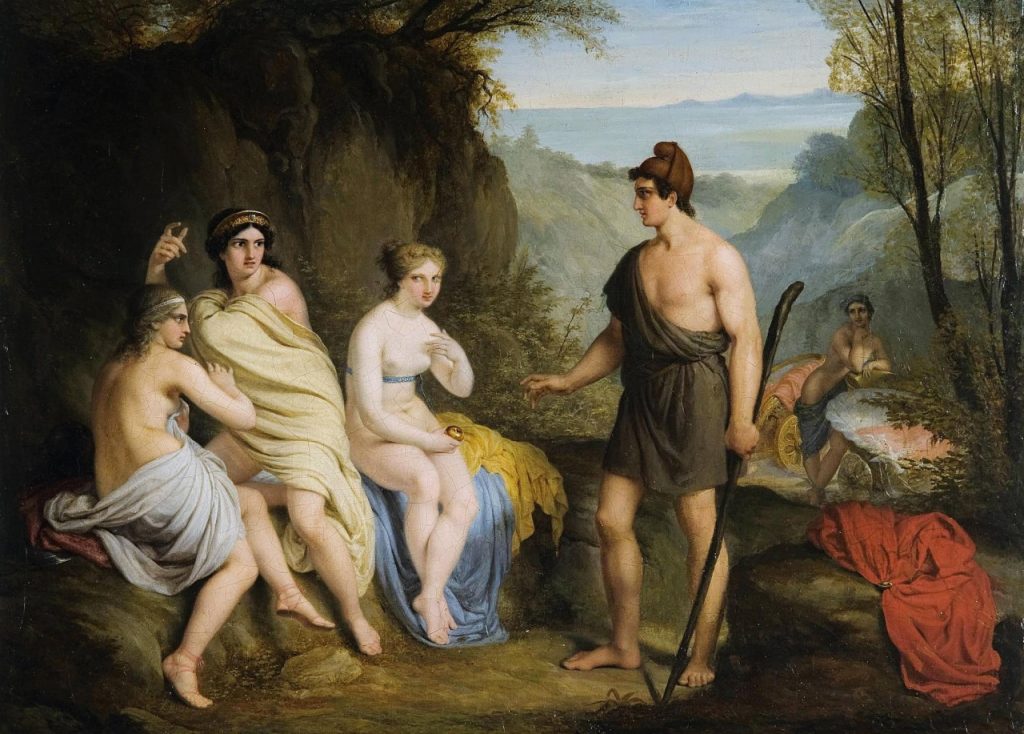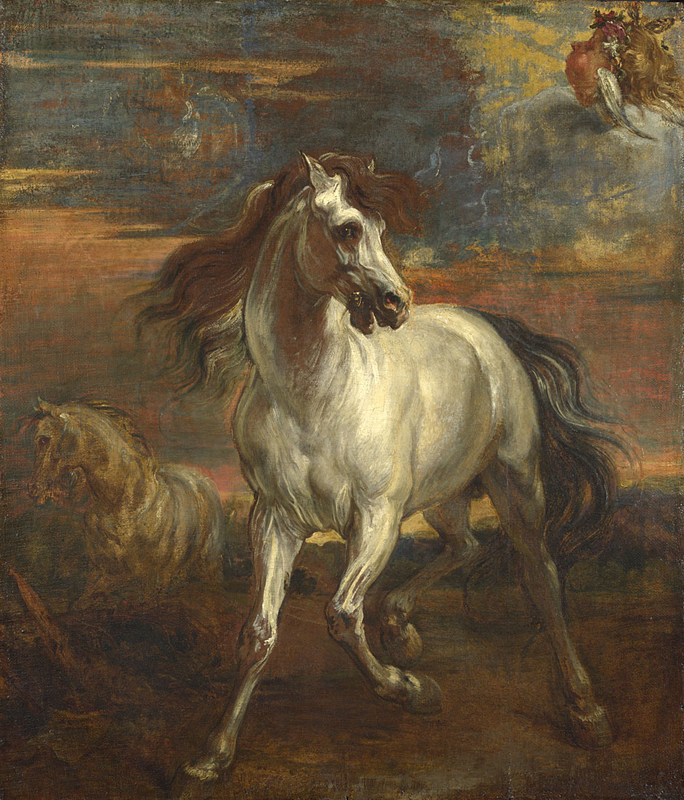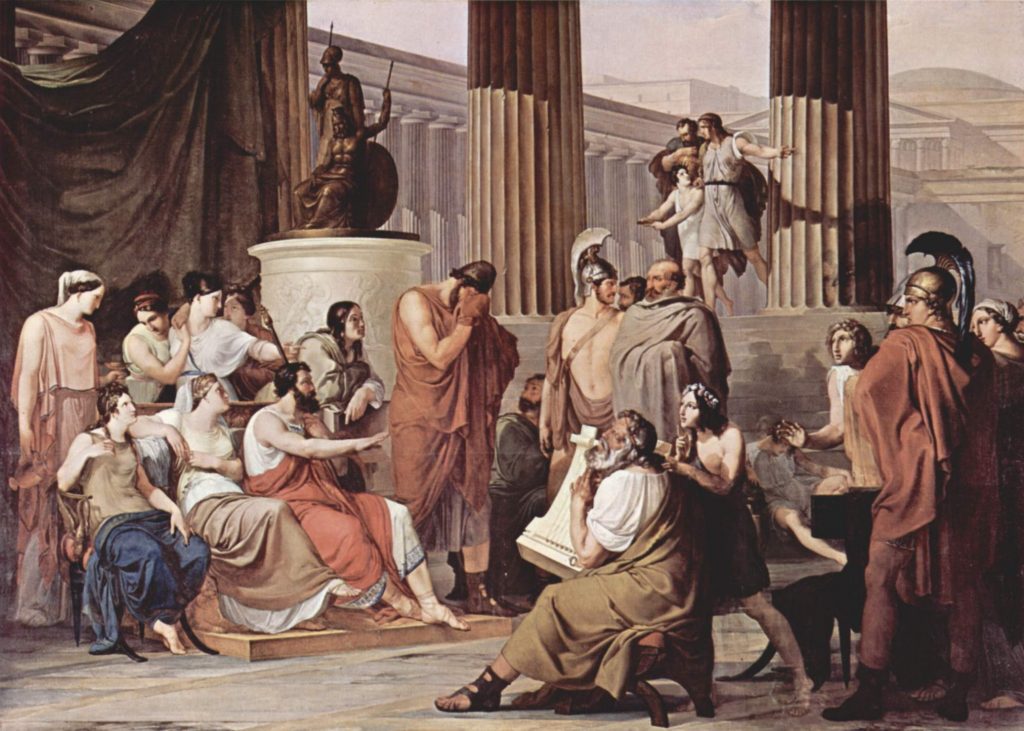Pierre Judet de La Combe in his book Homère (2017) evokes the gifts of the gods which are ambiguous and double-edged. One example he mentions is Demodokos:
62 The herald came near, bringing with him a singer, very trusted, 63 whom the Muse loved exceedingly. She gave him both a good thing and a bad thing. 64 For she took away from him his eyes but gave him the sweetness of song [aoidē].
Odyssey 8.62–64, Sourcebook[1]
As Judet de La Combe writes:
“We are in the middle of a paradox. The Muse’s love for this man begins by depriving him of his eyes. No crime is mentioned. Demodocos does not pay anything”
Homère, Pierre Judet de La Combe, p.124[2]
The Muse gave Demodokos a precious talent. Hesiod in his Theogony underlines the importance of the singer, who is the servant of the Muse:
For when someone has sorrow [penthos] in his thūmos beset by new worries and is distressed by sorrow in his heart, and when the singer [poet], 100 therapōn of the Muses, sings the klea of men who came before and the blessed gods who abide in Olympus, right away such a man forgets [lēth-] his troubled thoughts, and his cares he no longer remembers [mnē-]. Quickly the gifts of the goddesses turn him away from these things.
Hesiodic Theogony 98–103 [3]
Judet de La Combe talking about divine gifts, refers to Zeus having two jars:
on the floor of Zeus’ palace there stand two urns, the one filled with evil gifts, and the other with good ones. He for whom Zeus the lord of thunder mixes the gifts he sends, [530] will meet now with good and now with evil fortune;
(Iliad 24.527–533)[4]
To Peleus, Achilles’s father, the gods gave a poisoned gift. Peleus marries a goddess Thetis, but in return the son he has with her, Achilles, is doomed to die young. Glorious destiny certainly but painful.
The Phaeacians at first also seem to have no counterpart to the generosity of the gods towards them. We have the description of gifts from the gods in Scroll 7 of the Odyssey, gifts from the gods which are referred to as glorious [θεῶν ἔσαν ἀγλαὰ δῶρα].
However, the gods will undoubtedly hide these gifts by turning the ship of the Phaeacians to stone, and covering the city up with a mountain (Scroll 13).

Perhaps one of the most poisoned gifts is that gift given to Paris to award, when he chooses Aphrodite and gives her the apple of discord.
The war between the Greeks and the Trojans is the terrible consequence of this, and Aphrodite undoubtedly knows it, when she gives him Helen.[5]
Paris will also lose his life. However, Menelaos will earn immortality, and without unwelcome consequence, unless he regards Helen’s infidelity as such, after all it is thanks to her that he becomes immortal, as predicted by Proteus:
As for your own end, Menelaos, fostered son of Zeus, you shall not die in horse-pasturing Argos, but the gods will take you to the Elysian plain, which is at the ends of the world. There fair-haired Rhadamanthus [565] reigns, and men lead an easier life than any where else in the world, for in Elysium there is no snow, nor heavy winter-storm, nor rain, 567 but the Okeanos sends up the gusts of shrill-blowing Zephyros 568 at all times, so as to reanimate men. This will happen to you because you have married Helen, and are [570] Zeus’ son-in-law.
Odyssey 4.561–570, Sourcebook[6]
Nestor is also one of the lucky ones who has been granted to lead a very long life surrounded by his family in his palace in Pylos (Odyssey 3). However, it is a mixed blessing, because he has lost his son Antilokhos in battle.
Injustice seems to dominate in this relentless movement, difficult to understand and accept, of gift in exchange for evil.
Do the gods always make their offerings blindly, with no apparent logic?
Is there a logic in the motivation of the generosity of the gods?
Do mortals have a choice whether or not to accept these poisoned gifts?

In Scroll 3 of the Iliad, Paris explains to Hector that he had no choice but to accept divine gifts, because men must not or cannot refuse them. The gods do not give anything to anyone who asks and it is better to accept divine gifts when they are given, men have little choice.
And Alexandros the godlike answered, “Hector, your rebuke is just. [60] You are hard as the axe which a shipwright wields at his work, and cleaves the timber to his liking. As the axe in his hand, so keen is the edge of your mind [noos]. Still, taunt me not with the gifts that golden Aphrodite has given me; [65] they are precious; let not a man disdain them, for the gods give them where they are minded, and none can have them for the asking.
Iliad 3, Sourcebook[7]
Some useful gifts do not seem to have bad consequences, for example, some gifts given to Herakles: greaves from Hephaistos, and a breast-plate from Pallas Athena.
So he said, and put upon his legs greaves of shining bronze, the splendid gift of Hephaestus. Next he fastened about his breast [125] a fine golden breast-plate, curiously wrought, which Pallas Athena the daughter of Zeus had given him when first he was about to set out upon his grievous labors.
Hesiod, Shield of Heracles 122–127[8]
Agamemnon also receives some useful gifts determining his position as king of the Achaeans: The scepter but not the valor, says Diomedes (Iliad 9.32-39). Nestor later in the same scroll pinpoints that Zeus has given Agamemnon also the right to uphold what is right.
Zeus, moreover, has granted that you wield the scepter and uphold things that are right [themis], that you may take thought for your people under you;
Iliad 9.98-100, Sourcebook[9]
What about Achilles’ weapons, which are also given to him by gods?
Well, they bring sorrow.

Achilles’ first armor was borrowed by Patroklos who met his doom wearing them, and Hector who seized them and wore them did not fare any better. Zeus himself expresses his disagreement over the misappropriation of the armor. He will give Hector great power but in compensation Hector will die. Beware of what gods give you.
… he put on the immortalizing armor [95] of Achilles son of Peleus, which the skydwelling gods 196 gave to his father [= Peleus] near and dear. And he had given it to his son [= Achilles] 197 when he grew old. But the son himself never reached old age wearing the armor of his father. He [= Hector] was seen from afar by Zeus, gatherer of clouds. 199 There he [= Hector] was, all fitted out in the armor of the godlike son of Peleus. [200] Then he [= Zeus] moved his head and spoke to himself [= to his own thūmos] 201 “ Ah, you [= Hector] are a pitiful wretch. Your own death is not on your mind [thūmos]— 202 a death that is coming near.2 There you are, putting on the immortalizing armor 203 of a man who is champion, one who makes all others tremble. 204 It was his comrade you killed, gentle he was and strong, [205] and his armor, in a way that went against the order [kosmos] of things, from his head and shoulders 206 you took. All the same, I will for now put in your hands great power [kratos]. 207 As a compensation [poinē] for this, you will never return home from the battle.
Iliad 17, Sourcebook[10]
As for the other set of weapons given to Achilles by his mother Thetis and made by the god Hephaistos, Thetis brings them to her son, who will go and kill Hector to avenge Patroklos. However later after the death of Achilles, Odysseus and Ajax will fight with words for these weapons and Ajax, who lost the contest, will kill himself, as told in the Odyssey.
The spirits [psūkhai] of other dead men stood near me and told me each his own melancholy tale; but the psūkhē of swift-footed Ajax, son of Telamon, alone held aloof —still angry with me for having won [545] the cause in our dispute about the armor of Achilles. Thetis had offered it as a prize, but the Trojan prisoners and Athena were the judges. Would that I had never gained the day in such a contest [āthlos], for it cost the life of [550] Ajax, who was foremost of all the Danaans after the stately son of Peleus, alike in stature and prowess.
Odyssey 11, Sourcebook[11]
The gods also give gifts to other gods. Zeus rewards those who put themselves under his protection.
Zeus gives wonderful gifts to Styx, the daughter of Ocean. He calls her the keeper of the oaths. He also honors Hecate and gives her privileges on land, sea and in the sky. Zeus arranges the cast and keeps the bigger share, thinking that he took the biggest risks when he got rid of Kronos, his father.
Do we have examples of people who have refused divine gifts?
Socrates certainly did not refuse the gift that seemed to exist exceptionally for him alone, his daimōn, who talks to him and sends him messages. He died because of it, however he wanted to remain true to himself and his daimōn, So again the gift is corrupted.

In one very poignant passage in the Iliad, Zeus is moved when he sees Achilles’horses shedding tears as they mourned the loss of Patroklos. Zeus regrets that he has given them. Xanthos and Balios are indeed very special horses. Hera had given Xanthos a human voice, and they were immortal steeds.
The son of Kronos saw them and took pity upon their sorrow. He wagged his head, and muttered to himself, saying, “Poor things, why did we give you to King Peleus who is a mortal, while you are yourselves ageless and immortal? [445] Was it that you might share the sorrows that befall humankind? for of all creatures that live and move upon the earth there is none so pitiable as he is—still, Hector, son of Priam, shall drive neither you nor your chariot. I will not have it. [450] It is enough that he should have the armor over which he vaunts so vainly. “
Iliad 17, Sourcebook[12]
We could find abundant examples of divine gifts, as if humans always needed them and could not progress without them. Even the first woman Pandora, gift from the gods, was a poisoned one but she brought, at least, hope to men. Prometheus tried to free humans from servitude but it did not escape Zeus’ notice.
Prometheus tried to warn Epimethus, his brother never to accept gifts from Zeus, and to send it back but as Hesiod remarks in Works and Days:
..father Zeus sent the famed Argos-killer to Epimetheus, 85 the swift messenger of the gods, bringing the gift [dōron]. Nor did Epimetheus take notice [verb phrazesthai] how Prometheus had told him never to accept a gift [dōron] from Zeus the Olympian, but to send it right back, lest an evil thing happen to mortals. But he [Epimetheus] accepted it, and only then did he take note in his noos that he had an evil thing on his hands. 90 Before this, the various kinds of humanity lived on earth without evils and without harsh labor…
Hesiod, Works and Days[13]
Notes
[1] Sourcebook: The Ancient Greek Hero in 24 Hours Sourcebook of Original Greek Texts Translated into English. General Editor, Gregory Nagy
Homeric Odyssey 8. Translated by Samuel Butler. Revised by Soo-Young Kim, Kelly McCray, Gregory Nagy, and Timothy Power
[2] Pierre Judet de La Combe, 2017. Homère, Folio biographies, p.124 “On est en plein paradoxe. L’amour de la Muse pour cet homme commence par le priver de ses yeux. Aucun crime n’est mentionné. Demodocos ne paie rien” Where he quotes Greek texts, I have used available English translations.
[3] Sourcebook Hesiodic Theogony. 1–115: Translated by Gregory Nagy. 116–1022: Translated by J. Banks, adapted by Gregory Nagy
[4] Sourcebook Homeric Iliad. Translated by Samuel Butler. Revised by Soo-Young Kim, Kelly McCray, Gregory Nagy, and Timothy Power
[5] One version of this story is given in Apollodorus Epitome e.3.2
On Perseus
[6] Sourcebook Odyssey 4.Translated by Samuel Butler. Revised by Soo-Young Kim, Kelly McCray, Gregory Nagy, and Timothy Power
[7] Sourcebook, Iliad 3. Translated by Samuel Butler. Revised by Soo-Young Kim, Kelly McCray, Gregory Nagy, and Timothy Power
[8] Hesiod Shield of Heracles. Translation by Hugh G. Evelyn-White. Cambridge, MA.,Harvard University Press; London, William Heinemann Ltd. 1914.
On Perseus
[9] Sourcebook Iliad 9. Translated by Samuel Butler. Revised by Soo-Young Kim, Kelly McCray, Gregory Nagy, and Timothy Power
[10] Sourcebook Iliad 17. Translated by Samuel Butler. Revised by Soo-Young Kim, Kelly McCray, Gregory Nagy, and Timothy Power
[11] Sourcebook, Odyssey 11. Translated by Samuel Butler. Revised by Soo-Young Kim, Kelly McCray, Gregory Nagy, and Timothy Power
[12] Sourcebook Iliad 17. Translated by Samuel Butler. Revised by Soo-Young Kim, Kelly McCray, Gregory Nagy, and Timothy Power
[13] Sourcebook Hesiodic Works and Days. Translated by Gregory Nagy.
Image credits
Francesco Hayez: Odyssseus at the court of Alcinous. 1814–1815.
public domain, via Wikimedia Commons
Austrian School: The Judgement of Paris. 1800
public domain, via Wikimedia Commons
F. Hendrickx. Hector Censuring Helen and Paris. c 1820.
Photo: Diderot. public domain, via Wikimedia Commons
Peter Paul Rubens. Achilles slays Hector. c 1630–1635.
public domain, via Wikimedia Commons
Style of Anthony van Dyck. The Horses of Achilles.
Creative Commons CC BY-NC-ND 4.0, via The National Gallery
___
Hélène Emeriaud is a Team member at HeroesX, a MOOC on edX. She studied ancient Greek at school in France and for several years at the University of Minnesota. She holds a degree in Education from Montreal University, and a Master of Education from McGill University. She is an active participant and member of the Editorial Team in the Kosmos Society with a particular interest in ancient Greek and Latin language learning.
First Published November 3, 2021
